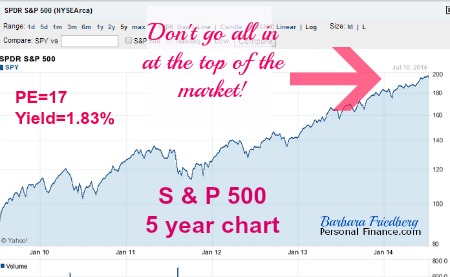Are We Due For Another Stock Market Crash?
With the memories of the year 2,000 tech bubble bursting and subsequent stock market crash along with the more recent crash in 2008, many investors are worried when the next crash will hit. The S & P 500 has more than doubled since then. Investors’ are increasingly elated with their recent portfolio gains, and fearful of the future.
Recent comments about the potential for a stock market crash:
Many of my family, friends, and followers are asking these questions.
1. Should I reduce my percent holdings in equities (stocks)?
2. How can I protect myself against a stock market crash?
3. When will we experience the next stock market crash?
Behavioral finance shows that we are not rational. We frequently invest based on irrational emotions. We get way too excited when markets are rising and frequently dive in after a big stock market increase. Then when the inevitable decline arrives, we jump out of equities at the bottom of the market.
These irrational, behavioral finance actions cause investors to buy high and sell low.
This article will discuss when the next stock market crash will occur, and what to do with your investments both now and in the future.
When Will the Stock Market Crash?
I don’t know and neither does anyone else!
Paul B. Farrell of Marketwatch writes:
“But when the Mack truck suddenly shifts into high gear … accelerating rapidly … finally catching all of us by surprise… none of this will matter … you’ll never hear it coming … till too late … few did in 1929, in spite of all the warnings … you didn’t hear in 2000 … nor in 2008 … nobody will in 2014 … the Mack truck will finally catch all by surprise, once again.”
A better question might be; “Is the overall stock market under, over, or fairly valued based upon historical metrics such as the price earnings ratio?”
Although not a perfect timing device (if it were, we’d all be genius investors), the PE ratio puts an approximate price tag on the market. Higher PE ratios suggest more overvalued and lower PE ratios suggest lower valuations. Even in an overvalued market, stock prices can continue to rise for a long time. Conversely, when PE ratios are low, it doesn’t mean they will rise immediately. To add to the confusion, there are various types of PE ratios, but that’s a topic for another article.
At present, the market PE ratio is hovering around 20 (June, 2015), up from 17 a year ago. Contrast that with the historical PE ratio of 14-15. As you can see, the market isn’t excessively overvalued, but it is definitely not undervalued.
Stock Market Investing Caution
I’m sending this advice to my Wealth Tips Newsletter subscribers soon and wanted to share it with you as well.
Many investors got scared after the last recession and got out of the markets. And some of those same investors have been sitting on the sidelines during this big run up and are considering diving in now, after the big increase.
I don’t know if this describes you or not, but research has shown that investors tend to go with the crowd and get into markets at the top and sell at the bottom.
As the S & P index chart above shows, the overall stock market has been on a tear.As I previously mentioned, although the PE is not in the stratosphere as valuations were at the end of the 1990’s, the market is not undervalued.
In plain English, that means, if you invest money now, your future returns will likely be below the 9% average returns of the market.
You can avoid these mistakes by sticking with what I consider the absolute best investing strategy.
Curb your instincts to go all into the market’s now.
My favorite investing approach is that of dollar cost averaging. It’s a systematic way to buy low and sell high. If you’re not already doing so, here’s how to get started, How to Buy Low and Sell High.
I’m not suggesting you get out of the markets.
I’m also not recommending that you avoid investing.
Think of this article as a yellow light suggesting you proceed with caution.
So, when will the stock markets crash? No one really knows, but it is a certainty that at some point there will be a stock market drop, when or how severe is unknown.
Should I reduce my equity exposure now? Only if you’ll be needing those funds within the next 10 years. If not, stick with your predetermined asset allocation.
How can I protect myself against a stock market crash? Be prepared, stay the course, and don’t panic.
Interested in building long term wealth? Then click here and learn the smartest way to invest.

